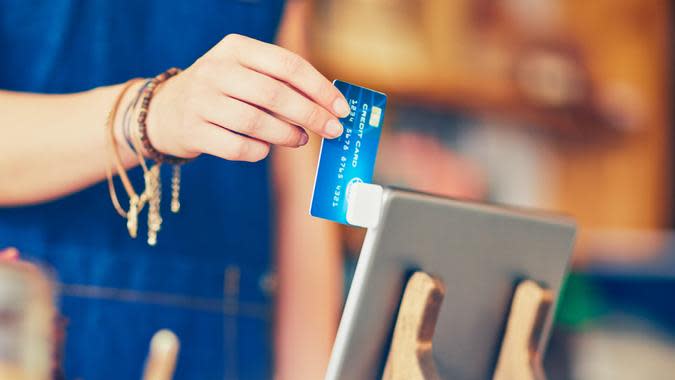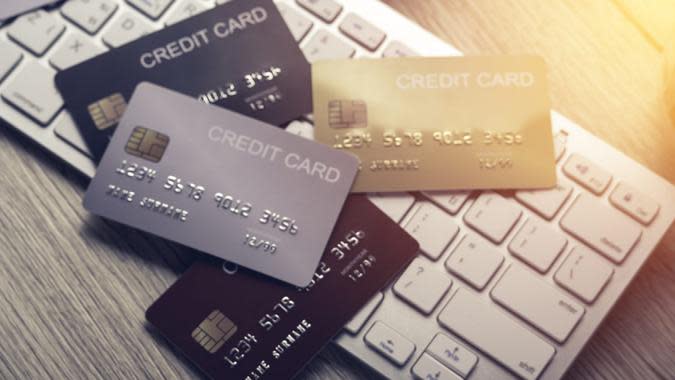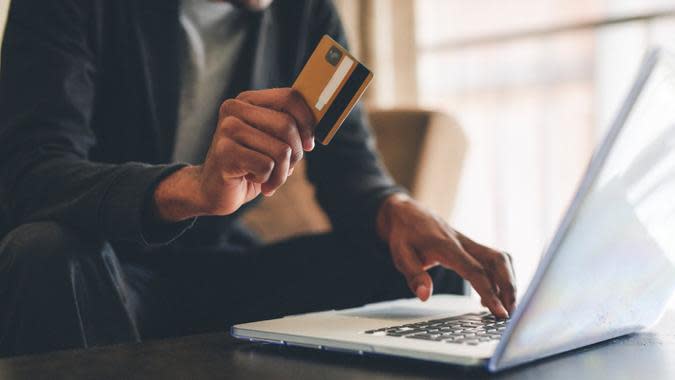10 Signs That It’s Time To Ditch Your Credit Card

In most cases, there's not a lot to gain and plenty to lose by canceling a credit card. When the amount of open credit at your disposal shrinks, your all-important credit utilization ratio grows. Credit utilization accounts for 30% of your FICO credit score -- at 35%, only your payment history carries more weight.
Explore: GOBankingRates' Best Credit Cards for 2023
Advice: 3 Easy Tips To Turn Your Credit Woes Into Wows
Even so, any drop you do suffer after closing a card won't be permanent -- and you can replace that credit line with one from a better card if you decide that one of your current cards is doing you more harm than good.
Before canceling though, you should make sure you've thought it through first, pay off your remaining balance, make sure you cash in on any rewards you've accumulated, check your credit report after you cancel and cut up your card -- yes, that last step is still very important. The following is a collection of 10 instances where it might be worth ditching a bad card, even if your score takes a temporary hit.

It Has an Annual Fee That Isn't Paying For Itself
There's a simple formula to determine if an annual fee is worth the expense. If it delivers enough rewards, perks, points, miles or cash back to offset the card's yearly cost, then it's worth it. If not, then it's not.
People agree to annual fees that they wind up regretting for all kinds of reasons -- because they overestimate the rewards, they didn't have great credit when they applied, and they sometimes just overlook the fee in the first place. If you have a card with an annual fee that isn't pulling its weight, that's a good contender for the chopping block.
Take Our Poll: How Long Do You Think It Will Take You To Pay Off Your Credit Card Debt?

It's a Store Card
If you've been in a big chain store, you've probably had a cashier tell you that you could save money on whatever it is you're buying if you pay for it with a store credit card -- and you can apply right there at the register. The problem, according to The Points Guy, is that store cards are notorious for their lousy terms.
Their credit limits tend to be low, which means if you carry a balance, your credit will suffer from a high utilization ratio even if you don't spend a lot. They also tend to have high interest rates and not offer bonuses.

Your Points, Rewards or Miles Expire
If you settled for a card that forces you to redeem your points or miles every so often or one that snags them away when they expire or if your account is inactive, it might be time to trade up. If you have good credit, you can get a travel card like Capital One Venture Rewards -- or one from a specific airline like United, Southwest, JetBlue and Delta -- with miles that never expire. You can also look for cards with different types of rewards, like cash back, that don't expire.

You Don't Get Any Rewards at All
Disappearing points that expire are one thing, but cards that don't come with any rewards at all deserve an extra close second look. Starter credit cards offer people the chance to build their credit by reporting on-time payments to the credit bureaus. The tradeoff is they rarely offer any rewards, points, cash back or miles. If you used a card like this to build your credit and your score has improved, you might have outgrown your credit card training wheels.

It's a Secured Card
If you hit a rough patch in the past and took out a secured credit card to try to rebuild your credit, that's probably not a card you want to hang onto once you're on better financial footing. The deposit you put down that serves as your credit limit will be a thing of the past once you're in a position to apply for an unsecured card. Before you cancel your old secured card and apply for an unsecured card with a different lender, CNBC recommends checking to see if the company that issued your secured card will give you an upgrade now that your credit has improved.

You're Overspending
It's not hard to find credible personal finance experts on both sides of this issue. Some believe that people who are irresponsible with money or who can't resist the temptations of consumerism are going to find a way to overspend -- plastic or no plastic. Others, however, feel that there's real power in canceling and cutting up a card that's being abused by a reckless spender -- it can be the first step to responsible budgeting.

It Has a Ridiculously High APR
The First Premier Bank Mastercard comes with an APR of 36% -- more than twice the average national rate. That's an outlier, even for cards for people with bad credit, but there are plenty of others that charge interest rates that people with fair credit or better shouldn't tolerate. The national average interest rate runs from the low 15s to the low 20s. If you have a card that charges too high a rate and you have a credit score that deserves better, perhaps that card's days should be numbered.

You Only Opened It To Transfer a Balance
If you have high-interest credit card debt, taking out a card with a 0% introductory APR can be a smart money move that lets you put that balance on the back burner for you to satisfy with only the minimum payments. When the introductory rate expires and your balance is paid down, however, you might find yourself stuck with a card that has less-than-stellar terms, which you only accepted to transfer your balance. That card might be on borrowed time.

It Has a Low Credit Limit
Overall credit utilization plays a big role in your credit score, but the ratio on each individual card has a big impact, too. If you have one card with a low credit limit, even small purchases can gobble up a big chunk of that card's available credit. That throws your ratio off balance and could make it look to lenders like you're spending irresponsibly, even if you're not.

It's Your Newest Card
If you recently opened a card that has any of the previously mentioned flaws -- a low credit limit, a high APR, lousy rewards, etc. -- that you didn't consider when you opened it, closing it sooner is better than canceling it later. The age of your combined credit accounts plays into your score. Canceling older cards that raise the overall age of your credit is worse for your score than canceling new ones that are making your credit look younger than it is.
More From GOBankingRates
Update: Some offers mentioned may have changed or are no longer available. View current credit card offerings from our partners at CardCritics here on the issuer's website.
This article originally appeared on GOBankingRates.com: 10 Signs That It’s Time To Ditch Your Credit Card
